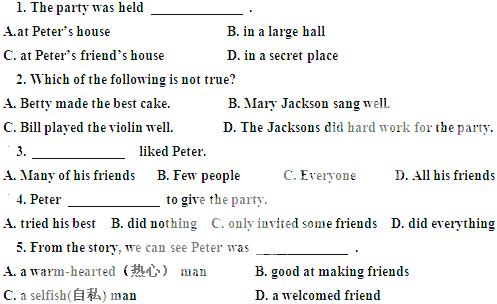题目内容
Peter wondered why he didn’t have many friends. The reason was he was always taking, never giving.
One day Peter told Bill, “I’d like to give a party on Saturday, I’d like you to come and bring Martha, too.”“Thanks, Peter. We’d be happy to come.”“Perhaps you’d like to bring your violin. You and Martha sing well together. I’m sure everyone will want you to sing for us.” That was how Peter began to plan his party. Next he asked another friend, Betty, to bring a cake. “You make the best cake in the world, Betty, and I like to eat your cake better than have one from the bakery.” Peter invited a few other friends to come to his party. He didn’t forget to ask something from each one of them. He even asked Jim and Mary Jackson to let him give the party at their house! They agreed.
The party was a big success. However, as the guests were leaving, they said “Thank you ” to Bill and Martha for the music, Betty for the cake, the Jackso ns for the use of the house and to others for their hard work. To Peter they just said, “Thanks for the invitation.”
ns for the use of the house and to others for their hard work. To Peter they just said, “Thanks for the invitation.”
1~5 CBBCC
解析

 赢在课堂名师课时计划系列答案
赢在课堂名师课时计划系列答案 天天向上课时同步训练系列答案
天天向上课时同步训练系列答案